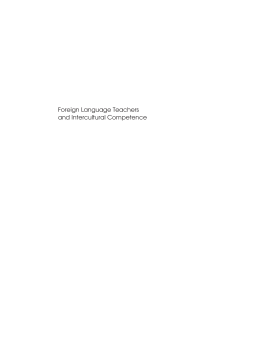
Additional Information
Book Details
Abstract
Foreign Language Teachers and Intercultural Communication: An International Investigation reports on a study that focused on teachers’ beliefs regarding intercultural competence teaching in foreign language education. Its conclusions are based on data collected in a quantitative comparative study that comprises questionnaire answers received from teachers in seven countries: Belgium, Bulgaria, Poland, Mexico, Greece, Spain and Sweden. It not only creates new knowledge on the variability, and relative consistency, of today’s foreign language teachers’ views regarding intercultural competence teaching in a number of countries, but also gives us a picture that is both more concrete and more comprehensive than previously known.
The authors of the book are all members of CULTNET, a network of researchers of interculture in foreign language education (http://millennium.arts.kuleuven.ac.be/cultnet). Lies Sercu (K.U.Leuven, Belgium) initiated and coordinated the project on which the book is based. The other project partners were Ewa Bandura (Jagiellonian University, Poland), Paloma Castro (University of Valladolid, Spain), Leah Davcheva (British Council, Bulgaria), Chryssa Laskaridou (Directorate for primary education on Western Thessaloniki, Greece), Ulla Lundgren (Jönköping University, Sweden), María del Carmen Méndez García (University of Jaén, Spain) and Phyllis Ryan (UNAM: Universidad Nacional Autónoma de México, México).
Table of Contents
| Section Title | Page | Action | Price |
|---|---|---|---|
| Contents | v | ||
| Foreword | vii | ||
| Preface | x | ||
| Chapter 1 Teaching Foreign Languages in an Intercultural World | 1 | ||
| Chapter 2 Objectives of Foreign Language Teaching and Culture Teaching Time | 19 | ||
| Chapter 3 Familiarity and Contacts with Foreign Cultures | 39 | ||
| Chapter 4 Pupils’ Culture-and-language Learning Pro.le | 50 | ||
| Chapter 5 Culture Teaching Practices | 75 | ||
| Chapter 6 Culture in Foreign Language Teaching Materials | 90 | ||
| Chapter 7 Experiential Culture Learning Activities: School Trips and Exchange Projects | 110 | ||
| Chapter 8 Opinions Regarding Different Facets of Intercultural Competence Teaching | 120 | ||
| Chapter 9 The Foreign Language andIntercultural Competence Teacher | 130 | ||
| Chapter 10 The Future of InterculturalCompetence in Foreign LanguageEducation: Recommendationsfor Professional Development,Educational Policy and Research | 160 | ||
| References | 182 | ||
| Appendix 1 Questionnaire | 186 | ||
| Appendix 2 Bonferroni Multiple Comparisons Test Results | 215 |
